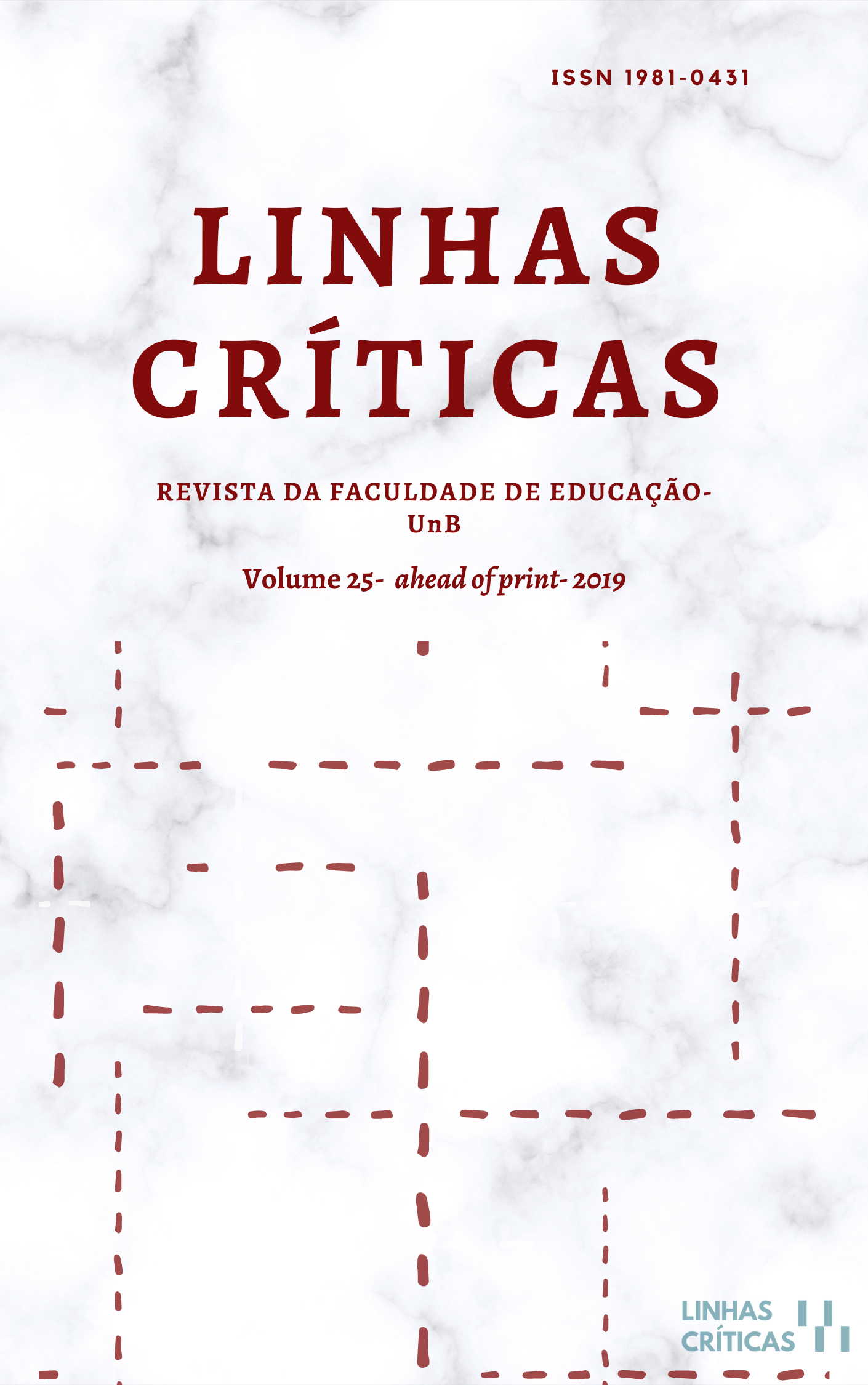Group of studies in the initial training of math teachers
DOI:
https://doi.org/10.26512/lc.v25.2019.23199Keywords:
Mathematical Education, Teacher training, Group of studies, Síndrome do DeltaAbstract
The present work aims to reflect about the contributions of the study group called Síndrome do Delta (SD) to the mathematics teachers’ training. Through this study group, we seek to promote an articulation between pedagogical knowledge and teaching practice, discussing the relation between theory and practice in weekly meetings. To do this, there was an approximation with two public schools in Goiás town, Brazil, in order to offer to the SD participants an academic training closer to the real context of the school and the teaching and the learning of mathematics in high school. During the year of 2017 the work was about mathematical tasks for teaching and learning of polynomial function of the first degree. The planned mathematical tasks were carried out in schools and later were discussed with the teachers in initial training, the teachers of the schools and with the coordinating teacher. They contributed to the production of articles and experience reports that were presented at scientific events. This production composes the material discussed here considering the literature studied in SD. The participation in this action contributed to the fact that the graduating students: understood the importance of the mastery of the content for the teaching of mathematics, from the interactions in classroom with high school students; perceived the complexity of the teaching and learning process by using observations in the evaluative form and in the field notepad and reflections with the study group; assuming an investigative posture, basing the pedagogical practice through the studied theory; and to socialize the experiences through the participation, with presentation of works in scientific events.
Downloads
References
Alarcão, I. (2007). Professores Reflexivos em uma Escola Reflexiva, 5 ed. Coleção Questões da nossa época. São Paulo, Cortez Editora.
Alrø, H., & Skovsmose, O. (2010). Diálogo e Aprendizagem em Educação Matemática. Coleção Tendências em Educação Matemática. Tradução: Orlando Figueiredo. Belo Horizonte: Autêntica.
Andrade, M. F. R., & Aparício, A. S. M. (2016). A construção colaborativa de sequências didáticas de gêneros textuais: uma estratégia inovadora de formação docente. In Práticas inovadoras na formação de professores. Marli André (org.) Campinas, SP: Papirus.
André, M. (2016). Formar o professor pesquisador para um novo desenvolvimento profissional In Práticas inovadoras na formação de professores. Marli André (org.) Campinas, SP: Papirus.
D’Ambrósio, U. (2016). Educação para uma sociedade em transição. 3. ed. Revista e ampliada. São Paulo: Editora Livraria da Física.
Ferreira, A. C. (2003). Metacognição e desenvolvimento profissional de professores de matemática: uma experiência de trabalho colaborativo. Tese de Doutorado, Universidade Estadual de Campinas, Campinas.
Fiorentini, D. (2004). Pesquisar práticas colaborativas ou pesquisar colaborativamente? In: BORBA, M. C.; ARAÚJO, J. L. (org.). Pesquisa Qualitativa em Educação Matemática. Belo Horizonte: Autêntica.
Freire, P. (1996). Pedagogia da autonomia: saberes necessários à prática educativa. Coleção Leitura. São Paulo: Paz e Terra.
Freire, P. (2011a). Cartaz à Guiné-Bissau: registros de uma experiência em processo. 5. ed. São Paulo: Paz e Terra.
Freire, P. (2011b). Pedagogia do Oprimido. 50. ed. rev. e atual. Rio de Janeiro: Paz e Terra.
Freire, P. (2013). À sombra desta mangueira. Paulo Freire; Ana Maria de Araújo Freire. 11. ed. Rio de Janeiro: Paz e Terra.
Freire, P. (2014). Pedagogia dos sonhos possíveis. Organização Ana Maria Araújo Freire. 1ª ed. São Paulo: Paz e Terra.
Freire, P. (2016). Pedagogia da solidariedade. Organização Ana Maria Araújo Freire, Walter Ferreira de Oliveira, 2ª ed. São Paulo: Paz e Terra.
Gatti, B. A., & Barretto, E. S. (2009). Professores do Brasil: Impasses e desafios. Brasília: Unesco.
Gatti, B. A., Barretto, E. S., & André, M. E. D. A. (2011). Políticas docentes no Brasil: Um estado da arte. Brasília: Unesco.
Ghedin, E., Oliveira, E. S., & Almeida, W. A. (2015). Estágio com Pesquisa. São Paulo: Cortez.
Imbernón, F. (2006). Formação Docente e Profissional: formar-se para a mudança e a incerteza, 6 ed. São Paulo: Cortez Editora.
Kenski, V. M. (2007). Educação e tecnologias: o novo ritmo da informação. Campinas, São Paulo, Papirus.
Mantoan, M. T. E. (2005). Inclusão escolar: O que é? Por quê? Como fazer? São Paulo: Summus.
Mizukami, M. G. N. (2013). Escola e desenvolvimento profissional da docência. In: GATTI, B. A. (org.). Por uma política nacional de formação de professores. São Paulo: Ed. da Unesp.
Murphy, C. U., & Lick, D. W. (2005). Whole faculty study groups: a powerful way to change schools and enhance learning. California: Corwin Press, Inc.
Pérez Gómez, Á. I. (2015). Educação na era digital: a escola educativa. Tradução: Marisa Guedes; revisão técnica: Bartira Costa Neves. Porto Alegre: Penso.
Pimenta, S. G. (2007). O estágio na formação de professores: Unidade teoria e prática? São Paulo: Cortez.
Skovsmose, O. (2007). Educação Crítica: incerteza, matemática, responsabilidade. Tradução Maria Aparecida Viggiani Bicudo. São Paulo: Cortez Editora.
Published
How to Cite
Issue
Section
License
Copyright (c) 2019 Revista Linhas Críticas

This work is licensed under a Creative Commons Attribution 4.0 International License.
Authors who publish in this journal agree to the following terms:
-Authors maintains the copyright and grants the journal the right of first publication, the work being simultaneously licensed under the Creative Commons Attribution License which allows the sharing of the work with recognition of the authorship of the work and initial publication in this journal.
- Authors are authorized to enter into additional contracts separately, for non-exclusive distribution of the version of the work published in this journal (eg publish in institutional repository or as a book chapter), with acknowledgment of authorship and initial publication in this journal.
-Authorers are allowed and encouraged to publish and distribute their work online (eg in institutional repositories or on their personal page) at any point before or during the editorial process, as this can generate productive changes as well as increase the impact and the citation of published work (See The Effect of Free Access).



